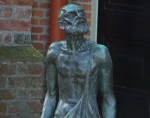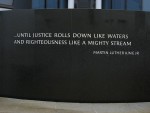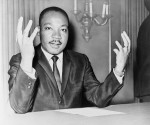Memory Verse Seek justice, protect the oppressed, defend the orphan, plead for the widow. Isaiah 1:17 Reflection My wife said it was not going to be easy. I knew she was right. She was referring to my current research. I am interviewing persons with disabilities in Uganda. My wife and I have lived in Uganda since 2008 so we are aware of the challenges people face here. We also know that challenges are especially intense among Ugandans with disabilities. … [Read more...] about Academic Justice? (Scholar’s Compass)
Lent 2015
Re-Interpreting Our Explanation Systems (Scholar’s Compass)
Image: Job Talks to God Drawing on her experience as lecturer and head of the Mission department at West Africa Theological Seminary in Lagos, Nigeria, Chinyere Priest contributes to our Lent justice series with further reflections on how our explanation systems can be just or unjust, empathetic or lacking empathy. Read Chinyere's previous ESN reflections on pursuing justice as a Christian academic here. If you put away the sin that is in your hand and allow no evil to dwell in your tent, then, free of fault, … [Read more...] about Re-Interpreting Our Explanation Systems (Scholar’s Compass)
Navigating Justice: Defender of the Accused (Scholar’s Compass)
Drawing on her experience as lecturer and head of the Mission department at West Africa Theological Seminary in Lagos, Nigeria, Chinyere Priest contributes to our Lent justice series with a reflection on pursuing justice as a Christian academic. She shares a story from a forthcoming paper, "Why Nigerian Christians Accuse People of Witchcraft," then meditates on God's justice as a theological scholar. When they cry out to the Lord because of their oppressors, he will send them a savior and defender, and he … [Read more...] about Navigating Justice: Defender of the Accused (Scholar’s Compass)
Scholar’s Compass: God Was the First to Cry, Part 2
In the second of her two part series, Lauri Swann reflects on Navigating Justice for the Scholar's Compass Lent series. “God was the first to cry.” – Martin Luther King, Jr. in Selma [H]e will wipe every tear from their eyes. Death will be no more; mourning and crying and pain will be no more, for the first things have passed away. - Revelation 21:4, NRSV Reflection Yes, God was the first to cry. Just like God was the first to set His face upon evil to (Leviticus 20:6); to stretch out his hand (Isaiah … [Read more...] about Scholar’s Compass: God Was the First to Cry, Part 2
Scholar’s Compass: God Was the First To Cry, Part 1
In this two part series, Lauri Swann reflects on Navigating Justice for the Scholar's Compass Lent series. “God was the first to cry.” – Martin Luther King, Jr. in Selma Reflection In the movie Selma, Martin Luther King, Jr. is seen consoling Mr. Cager Lee, an 82 year old man, who is in the morgue identifying the body of his grandson, Jimmy Lee Jackson. Jimmy, killed in 1965 during a peaceful protest in Selma, Alabama by a state trooper, was only 27 years old. With no other words worthy enough to … [Read more...] about Scholar’s Compass: God Was the First To Cry, Part 1



